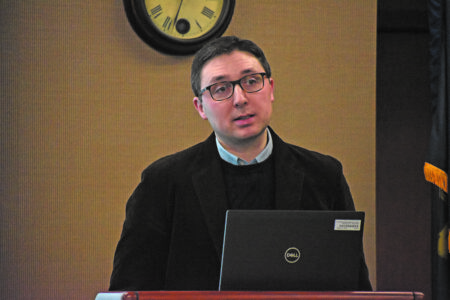Sustainability Film Series a decade old
HOUGHTON — Michigan Technological University’s Sustainability Film Series recently finished its 10th year, said Joan Chadde. Chadde is the director of the Center for Science & Environmental Outreach Education Program; Coordinator of the Western U.P. Center for Science, Math & Environmental Education Lake Superior Stewardship Initiative, and she is also the Sustainable Film Series Coordinator.
The program began as the Green Film Series in 2011, but was subsequently renamed the “Sustainability Film Series” at the suggestion of two Michigan Tech graduate students who were serving on the film selection committee. Jessica Daignault (CEE PhD candidate) and Ande Myers (CFRES M.S. student) suggested the new name as they felt that it would sound more relevant to more people, including students. The other committee members agreed, states the Sustainability Film Series website.
The Film Series focuses on a range of significant topics concerning the environment, including: Water, energy, climate change, as well as many social and community topics: Economics, under-represented voices, sustainable food production, and more. Following each film, a facilitator knowledgeable on that topic, leads an informal discussion.
“We run the films from January to May,” said Chadde, “so this is the last show of the 10th year.”
The last film for the 2020 season was a 27-minute minute production called “Seven Generations River,” shown on May 21.
The half-hour long Great Lakes documentary reveals how a Native American tribe, the Pokagon Band of the Potawatomi Indians in SE Michigan, is adopting scientific methods to preserve and protect its traditional culture and the river on which it relies. While never removed from their ancestral lands, the Pokagon are seeing their way of life fractured by encroaching development and land use changes.
“In order to prevent having to be relocated,” said Chadde, “they’ve had to assimilate, and we were told on the phone that they had to become Christian, so they weren’t made to leave. But now, they’ve been through that assimilation process, and now they’re trying to take back their culture, and part of that is to take back their natural resources, and bring them back to the health that they want, because they were farming and other things like that.”
The topic is relevant locally, said Chadde, because it is what the Keweenaw Bay Indian Community is doing, restoring their natural resources. The KBIC has recently gained the authority to enforce their own water quality laws.
In an April 28, 2020, statement, the U.S. Environmental Protection Agency (EPA) Region 5 announced the approval of the Keweenaw Bay Indian Community’s (KBIC’s) application for “treatment in a similar manner as a state” under the federal Clean Water Act for the L’Anse reservation in Michigan. The tribe is now authorized to set water quality standards for its reservation.
As with Pokagon Band in southeast Michigan, the KBIC’s efforts are just a part of reclaiming their culture, said Chadde.
“The Pokagon Band was not officially recognized until 1994,” she said, “which sounds very recently, so they just had to go through that process. So again, they’re reclaiming their culture and their natural resources.”
The Green Film Series is cosponsored by Lake Superior Stewardship Initiative, Michigan Tech Great Lakes Research Center, Keweenaw Unitarian Universalist Fellowship, Keweenaw Land Trust, and Sustainable Futures Initiative, and coordinated by the Michigan Tech Center for Science & Environmental Outreach.




